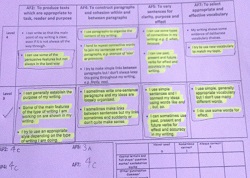Having students identify for themselves where they think they need to improve and then comparing this to their performance on a task will give an accurate insight into which parts of the criteria they do not understand how to satisfy. The teacher can then point this out and explain how it can be achieved. A good method to conduct this is by using 'predictive grids':

Too often, students see the grade that they receive and do not take enough notice into the written feedback that is given during marking. Dylan Wiliam's suggestion of not giving the grade to the students works but I've been wanting the students to engage with the success criteria when it comes to their exams and they really are incredibly motivated by seeing the grades, or even a number.
Something suggested by a colleague, which I've started to implement with exam classes, is 'predictive grids'. These are success criteria grids (usually using the exam board language as much as possible) which the students highlight according to what they think they achieved in the piece of work. This can either be done directly after the piece of work is finished or the lesson after which is what I usually prefer to do. When the work is marked, the teacher can then see where specifically the students are not achieving, but also see if the students know if they are not achieving in that particular area.

Isn't it curious that all of you and and all of your students use the internet daily but none of you exploit its potential for teaching, learning and creativity? Isn't it curious that schools force their students to inhabit this alternative reality for six or seven hours every day where the internet doesn't exist?
Earlier this week I led a seminar for PGCE students at Nottingham University on the use of the internet and its potential for encouraging pupils’ creativity. To start, I asked those present to put their hands up if they used the internet daily. All hands went up. I then asked them to keep their hands up if their pupils used the internet on a daily basis. After a moment’s thought, all hands stayed up.
However, when I asked the PGCE students – who had all finished their first teaching placement – to keep their hands up if they planned or been encouraged to plan lessons, sequences of lessons or homework that required the use of the internet, all hands went down. Isn’t it curious, I asked them, that all of you and and all of your students use the internet daily but none of you exploit its potential for teaching, learning and creativity? Isn’t it curious that schools force their students to inhabit this alternative reality for six or seven hours every day where the internet doesn’t exist?

A community-driven platform for showcasing the latest innovations and voices in schools
Pioneer House
North Road
Ellesmere Port
CH65 1AD
United Kingdom